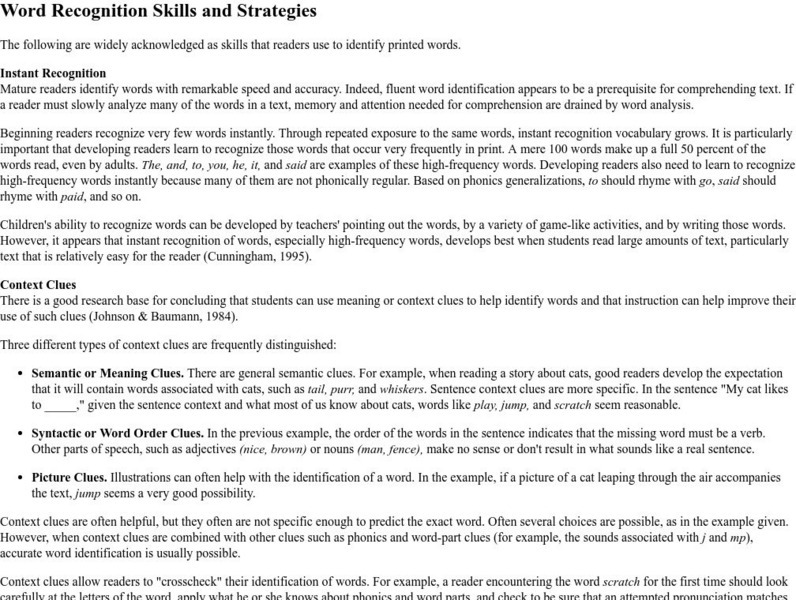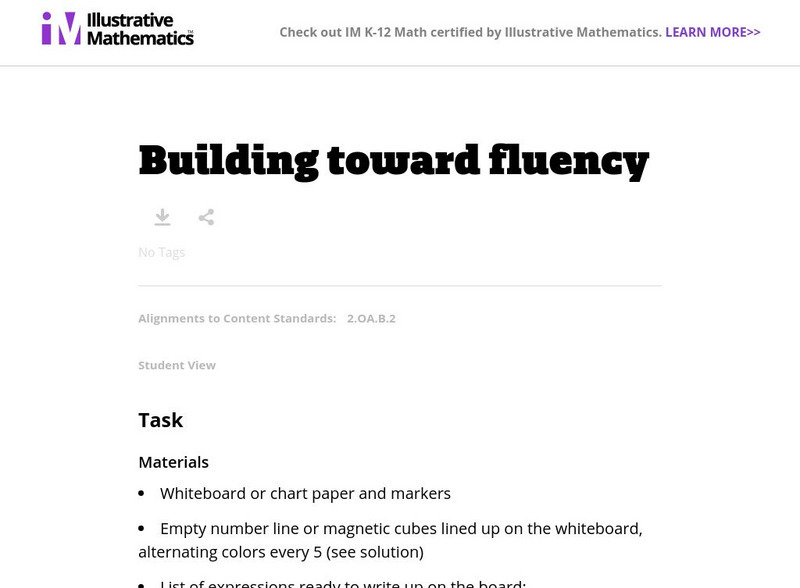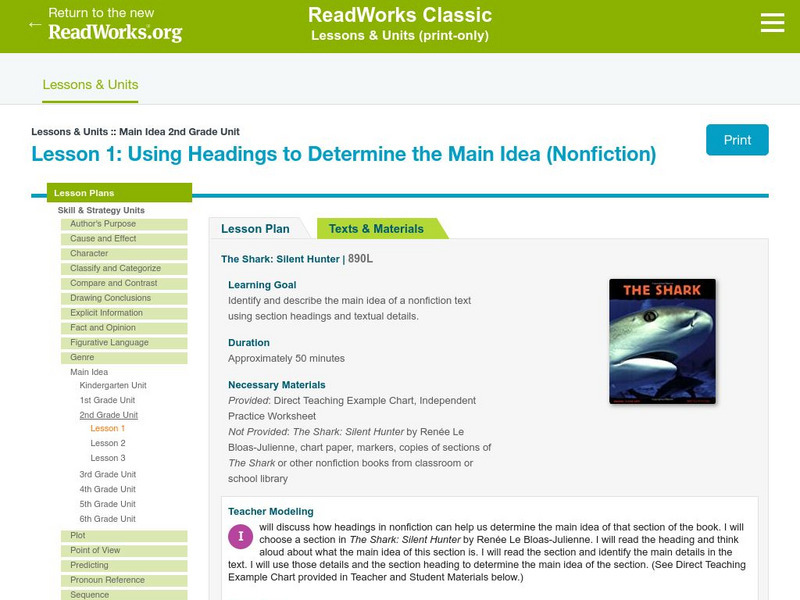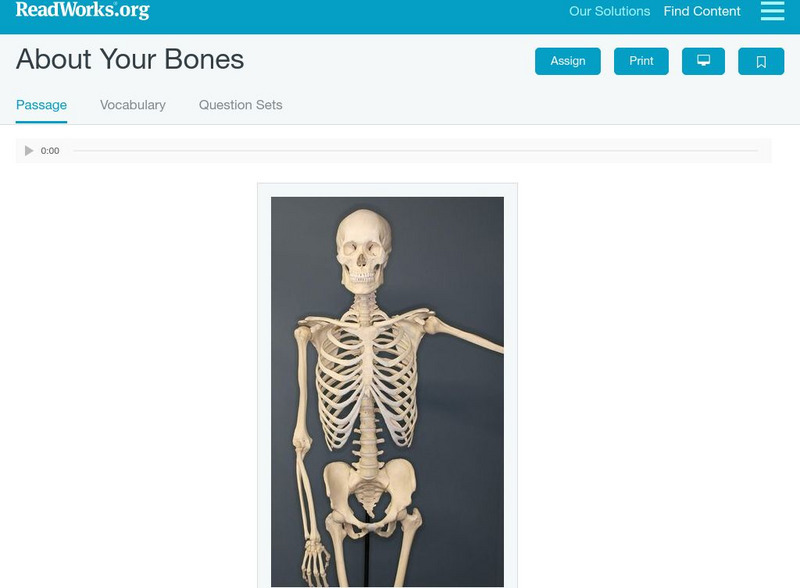Hi, what do you want to do?
Reading Rockets
Reading Rockets: Descriptive Writing
This is a comprehensive article about what descriptive writing including what it is, why to teach it and strategies to teach it. It also features two videos Five Senses Graphic Organizer and Writing Poems as well as an annotated list of...
Wisconsin Response to Intervention Center
Wisconsin Rt I Center: Repeated Readings [Pdf]
Classroom teachers will learn about reading repeatedly, an effective instructional strategy. Teachers will learn how to implement repeated readings, understand how to measure progress with repeated readings, and find research that...
Alabama Learning Exchange
Alex: What Can We Learn From Pigs?
This thematic language arts lesson uses a variety of beginning reading books about pigs to help special education/early elementary young scholars learn about character traits and concepts. The wide use of graphic organizers introduces...
ReadWriteThink
Read Write Think: Collaborative Prewriting and Drafting
A very useful activity that incorporates the process of collaboration to elementary young scholars. Students brainstorm and use prewriting strategies to write a group story.
Reading Rockets
Reading Rockets: Decoding and the Jabberwocky's Song
What is reading? Explore this article from to find the answer to this question.
Scholastic
Scholastic: Investigating Nonfiction Part 3: Independent and Guided Reading
This article provides tips for using nonfiction with guided reading and independent reading. The following strategies are shared: ways to help kids select "just right" nonfiction books; lessons to use with nonfiction in guided reading...
McGraw Hill
Mc Graw Hill: How to Use Strategies to Teach Students to Access Complex Texts
In this short video, the strategies of summarizing, clarifying, and asking-answering questions are used. These instructional tools will help teachers show students how to access complex texts. [5:54] CCSS.ELA-Literacy.CCRA.R.10
Education Place
Houghton Mifflin: Eduplace: Word Recognition Skills and Strategies
Included is a brief article outlining the skills that readers, all educational levels, use when they identify printed words. This site contains background material only and no related activities.
Illustrative Mathematics
Illustrative Mathematics: Building Toward Fluency
The purpose of this task is to promote certain addition strategies that will help learners learn to fluently add and subtract within 20. Students will use a number line or magnetic cubes to solve addition problems. Learners will be asked...
Read Works
Read Works: Using Headings to Determine the Main Idea: The Shark: Silent Hunter
[Free Registration/Login Required] Reading comprehension strategies are the focus of this ReadWorks lesson. Students will pay attention to headings, subheadings, and other text features to help them comprehend nonfiction text. Renee Le's...
ReadWriteThink
Read Write Think: Text Talk (Read Aloud)
This online lesson supports the language development and reading comprehension of kindergarten through second graders. Through the use of an innovative "Text talk," strategy, students will explain, develop, and expand upon story ideas....
Better Lesson
Better Lesson: Emergent Readers With and Emergent Reader
Students will sequence story events with the teacher and read an emergent reader in a guided setting. The chosen book, "Pilgrims and Wampanoag: Together They Were Better", has high use of sight words and high levels of picture support...
Reading Rockets
Reading Rockets: Building Background Knowledge
The importance of background knowledge is especially salient in the age of Common Core. This article offers practical classroom strategies to build background knowledge such as using contrasts and comparisons and encouraging...
Other
Strategies for Reading Comprehension:reciprocal Teaching
Use this page to understand the reciprocal teaching strategy that includes the role of the clarifier in student groups.
Daily Teaching Tools
Daily Teaching Tools: Cooperative Learning: Great Grouping Strategies
This Daily Teaching Tools resource provides a flexible grouping strategy. An explanation is provided that explains how to use tongue depressers to divide students into cooperative learning groups.
Wisconsin Response to Intervention Center
Wisconsin Rt I Center: Event Map [Pdf]
Teachers will learn how to use event maps with students. They will learn how to implement event maps with literary and informational texts; measure progress with event maps; and find research to support event maps. A reproducible event...
Khan Academy
Khan Academy: Using Khan Academy for Lesson Aligned Practice
How you can use Khan Academy's content for in-class guided and independent practice.
Reading Rockets
Reading Rockets: Audio Assisted Reading
A resource for teachers to understand how to effectively use audio books in their reading programs. Includes links to teaching materials.
ReadWriteThink
Read Write Think: Book Review Template
Use this book review template to help students communicate what they have read in a more efficient manner. Other ideas for its use are provided.
PBS
Pbs Learning Media: Molly of Denali: Party Moose Lesson Plan
This lesson, using the animated story "Party Moose" from the series Molly of Denali, shows the importance of paying attention to meaning while reading and using strategies, such as rereading, when something doesn't make sense. Molly and...
Scholastic
Scholastic: Instructor: Reading Clinic: Strategy Inventory
This lesson plan includes a group of activities that will teach students how to use vocabulary knowledge to help with comprehension of a text. Split into three activities, this lesson plan encourages students to use prior knowledge, word...
Other
Literature Lesson Plan
This lesson plan is for a character study that uses butcher paper, pens, pencils, and copies of assigned book. Young scholars then complete a character study on at least two major characters.
Read Works
Read Works: About Your Bones
[Free Registration/Login Required] This nonfiction passage discusses the skeletonThis passage is a stand-alone curricular piece that reinforces essential reading skills and strategies and establishes scaffolding for vocabulary learning....
Read Works
Read Works: All About Koalas
[Free Registration/Login Required] This informational text passage is about the topic of koala bears. This passage is a stand-alone curricular piece that reinforces essential reading skills and strategies and establishes scaffolding for...























